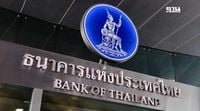Shares of GSK surged by more than 3% on Wednesday following the company's announcement of a remarkable 56% increase in earnings per share for the first quarter of 2025. This growth was bolstered by a 50% rise in operational profits, driven primarily by robust sales in its Specialty Medicines division and stronger-than-expected cash flow. For the quarter ending March 31, GSK reported revenues of £7.52 billion, marking a 4% increase at constant exchange rates compared to £7.36 billion during the same period last year.
The pharmaceutical giant's core earnings per share rose by 5% to 44.9 pence, while total earnings per share increased to 39.7 pence from 25.7 pence. GSK's operational profit climbed by 5% to £2.53 billion, supported by a favorable mix of products, higher royalty revenues, and ongoing cost control measures.
Specialty Medicines emerged as the key driver of GSK's growth, with sales soaring 17% to £2.93 billion. The company's HIV treatments experienced a 7% increase, fueled by rising demand for long-acting therapies such as Cabenuva and Apretude. Additionally, sales in the respiratory, immunology, and inflammation sectors surged by 28%, led by strong performances from Nucala and Benlysta. Sales in oncology also saw a significant boost, increasing by 53% thanks to products like Jemperli and Ojjaara.
Emma Walmsley, GSK's CEO, expressed confidence in the company's ongoing innovation and commercial excellence. "GSK continues to demonstrate strong progress, showcasing the quality, strength, and resilience of our portfolio," she stated. She highlighted that two of the five expected regulatory approvals in the U.S. have already been achieved, emphasizing the company's advancements in drug launches and critical trials.
Despite the positive results, vaccine sales faced challenges, dropping by 6% to £2.1 billion. This decline was primarily attributed to a 57% decrease in sales of Arexvy, GSK's RSV vaccine, due to limited recommendations in the United States and reduced demand in certain international markets. Similarly, sales of Shingrix, the shingles vaccine, fell by 7% as growth in Europe was offset by weaker performance in the U.S. and Asia. Conversely, sales of the meningitis vaccine increased by 20% due to strong uptake in Europe.
General Medicines revenue remained flat at £2.49 billion, with Trelegy, a once-daily treatment for respiratory diseases, growing by 15% to £675 million, offsetting declines in other portfolio areas. Regionally, Europe exhibited the strongest growth, with sales rising by 11%, while the U.S. saw a 4% increase, and international markets experienced a 2% decline due to exchange rates and tough comparisons to the previous year.
GSK generated £1.3 billion from operations, up from £1.13 billion the previous year, and doubled its free cash flow to £697 million. This improvement was attributed to higher operational profits and reduced capital expenditure. GSK maintained its outlook for 2025, forecasting revenue growth of 3% to 5% and a 6% to 8% increase in both core operating profit and earnings per share, all at constant exchange rates.
Looking ahead, GSK anticipates Specialty Medicines revenue to grow at a low double-digit rate, while vaccine revenue is expected to decline slightly, and General Medicines revenue is projected to remain relatively stable. The company announced a first-quarter dividend of 16 pence and indicated plans for a £273 million share buyback as part of a broader £2 billion repurchase program.
In light of strong progress in late-stage clinical research and the momentum in product launches, GSK remains optimistic about its prospects for the year.
Meanwhile, the Bank of Thailand (BOT) reported on the Thai economy and monetary policy for April and the first quarter of 2025, indicating a slower expansion. The Thai economy showed signs of deceleration in April, primarily due to a contraction of -0.5% in the manufacturing sector compared to a growth of 0.9% in the previous month. Private investment also saw a decline of -1.0%, a slight improvement from -1.5% in the previous period.
This slowdown is attributed to decreased production in export-reliant sectors, coupled with reduced private investment amid concerns regarding economic recovery and financial stability. The overall export output improved slightly, recovering from a -3.9% decline in the previous month to -0.7% in April, particularly in the automotive and hard disk drive sectors.
Overall, the value of exports fell by 2.0%, a stark contrast to the previous month’s 5.2% growth, reflecting lower export values across most product categories. While exports to India increased following adjustments in import regulations, overall performance in ASEAN and other markets remained subdued.
Tourism figures also revealed a mixed bag. From March 1 to April 27, 2025, Thailand welcomed 11.8 million foreign tourists. However, the number of visitors decreased significantly, particularly from Muslim-majority countries due to the earlier arrival of Ramadan this year. Chinese tourist numbers also declined, albeit at a slower rate than in previous months.
Despite the challenges, government spending, excluding transfers, expanded compared to the same period last year, driven by both recurrent and capital expenditures. The government’s recurrent expenditure grew by 31.4%, influenced by spending in education and pension payments. Capital expenditure surged by 129.6%, reflecting investments in infrastructure and public utilities.
In terms of monetary stability, the Thai baht remained relatively stable against the dollar in March, following the U.S. Federal Reserve's decision to maintain interest rates. However, in April, the baht experienced fluctuations, initially depreciating due to foreign capital outflows before strengthening again after the U.S. postponed its planned import tariffs.
Inflation rates showed a slight decrease, with the general inflation rate at 0.84%, down from 1.08% in the previous month, primarily due to falling energy prices. The labor market saw a slight improvement, with the number of insured workers increasing to 12.09 million, although concerns remain regarding the impact of U.S. trade policies and tourism slowdowns on employment.
In summary, the Thai economy experienced a slowdown in April, influenced by declines in tourism and private investment, while government spending continued to grow, indicating a mix of challenges and resilience as the country navigates its post-pandemic recovery.




